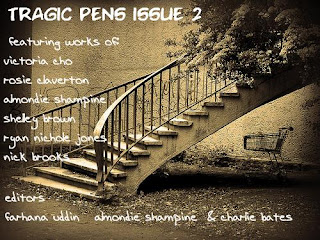Eggshells
Before Mara could finish questioning the wisdom of this trip, Ma was already waving from the upstairs window, wearing the same faded red, pansy-printed house she had likely worn every other Sunday for the last thirty years or more. Mara could describe each frayed piece of the fabric, not only because she saw it in her mind whenever she pictured Ma, but because she’d spent so much time as a child hiding from the world underneath it.
They met inside the house and greeted one another without words of endearment, without embracing; just right to the business at hand – avoidance. “Lawd chile, what you doin’ wit’ ya hair now? All dat money, can’t ya pay somebody to do somethin’ wit’ it?”
“It’s called the natural look, Ma. I did pay somebody to do this.”
“Uhn, look like a natural mess to me.” Ma laughed. “I’ put a pressin’ comb on it fo’ ya fo’ free. Yer Dad’s out back.”
Dad sat atop his ancient, red, riding mower, mowing and drinking what was almost surely corn liquor, wrapped in a brown paper bag.
Mara sat in the kitchen with Ma, snapping peas, peeling potatoes, and soaking greens. “You listen here girl, now, ya Mama an’ them comin’.”
For her entire life, Mara had called the woman who gave birth to her V, like everyone else; not Mama, not ever, and V had never been heard to object.
“Ma, but she never did nothing.” Mara said, so easily abandoning her normal penchant for proper speech and other civilities in Ma’s house.
“She’ my daughter, and yo’ mama, an’ this is my house and I say she’ comin’ here to have Easter dinner wit’ us.” Ma paused to catch her breath. ”Now you just keep ya mouth shut if ya aint got nothing nice to say. Hear?”
“Ma, if she brings him again, I just can’t sit at the table and act like everything is ok. I just won’t!”
“Don’t you say it, chile.”
Suddenly, Mara felt possessed. “What, Ma, that he raped me and my Mama did nothing?”
Ma’s strong, weathered fist lifted the bag of flour and pressed firmly into it until fine white frustration seeped out of the seams. “Don’t ya talk with dat nasty mouth in my house girl, now, I jus’ ain’t gon’ have it.” Then quietly she demanded, “Now make yo’self useful and set dat table.”
---
Shelley Brown is a lawyer by trade and a writer by heart. Her work is largely intended for private, non-profit purposes, but some of hermore recent expressions can be found in web spaces such asTheNextBigWriter.com. She lives in Jersey City with her husband, 3 year old daughter and a host of imaginary friends.
Photograph by Roy Hutchinson.











